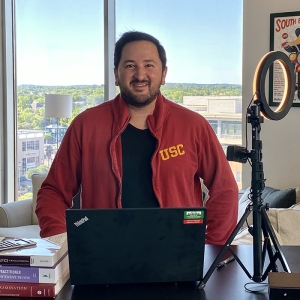Caring for Our Most Fragile Members of Society
May 06, 2020 / by Lynn Lipinski- Students
Master of Science in Nursing (MSN) student Anthony Lista, RN, was just learning the ins and outs of his new job as director of population health for a large nursing home operator, Genesis Healthcare, when the COVID-19 pandemic began.
Then everything changed, including his job duties. Lista answered the call to serve as a member of his employer’s infection prevention team. The position focuses on reducing the spread of the new coronavirus among a nationwide network of nursing homes.
Working out of Austin, Texas, Lista’s days are filled with back-to-back video conferencing meetings for his new role at work, in addition to completing his classwork and finals for his master’s degree. He graduates in May 2020 from the USC Suzanne Dworak-Peck School of Social Work.
Providing care from coast to coast
Genesis Healthcare runs 400 nursing homes throughout the United States, so he begins work at 7 a.m. for his East Coast colleagues, and stays online through 8 p.m. to talk with those on the West Coast.
The conversations all center on how to prevent the spread of COVID-19. More often than not, the discussions turn to two things in short supply for long-term care facilities these days: personal protective equipment like masks and gloves, and coronavirus tests.
“It is emotionally draining work,” Lista said. Talking to the nursing home administrators, doctors and nurses at facilities throughout the country crystallizes for him the scope of the COVID-19 pandemic. Some of the challenges are the same, while others differ depending on the city or state where the facility operates.
“A large share of my time is spent listening and trying to understand the full context of the problems they are facing,” he said.
For Lista, that deep listening stems from work he has done in the MSN program with its focus on clinical research and consideration of social determinants—factors like the conditions in which people work and live—as well as physical and medical aspects of people’s health.
Within the context of his studies to be a family nurse practitioner, Lista has learned to tune into what the patient has to say about how their condition or disease started. Representing the infection prevention team, he applies the same skills to help nursing home administrators and others find solutions to problems related to stopping the spread of coronavirus.
Keeping up morale
It has been a difficult time for those working in nursing home facilities. Nearly eight weeks have passed since patients have seen their family or friends in person. Though the communal nursing home environment does provide a social network and activities as well as daily assistance and meals, it can be hard for nursing home staff to have to tell patients that their loved ones can only visit through video or the phone.
Making things even more emotionally challenging is when the news media draws on negative stereotypes of nursing homes as depressing or isolating institutions housing those who have come to the end of their lives.
This can be demoralizing to those working on the front lines in long-term care facilities.
What people forget, Lista said, is that for some nursing home residents, staff are like extended family, helping older or vulnerable adults to live safely, securely, and with the support they need.
In reality, many find working with this vulnerable population highly rewarding.
“These are places where doctors, nurses, and nurses’ aides are still showing up to take care of our most fragile members of society,” Lista said.
That is one thing that has not changed due to the pandemic.
To reference the work of our faculty online, we ask that you directly quote their work where possible and attribute it to "FACULTY NAME, a professor in the USC Suzanne Dworak-Peck School of Social Work” (LINK: https://dworakpeck.usc.edu)
